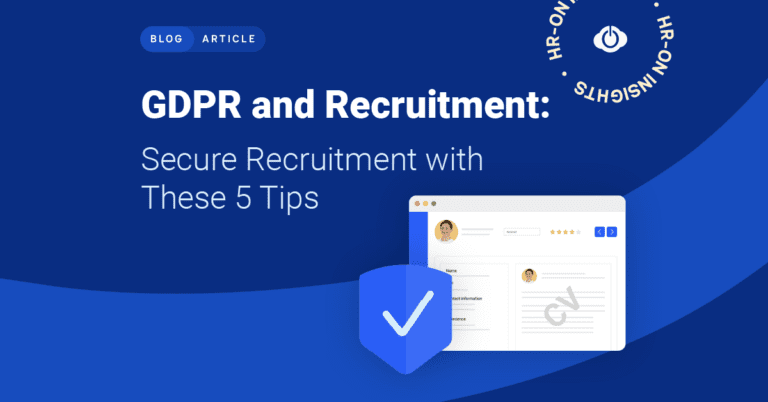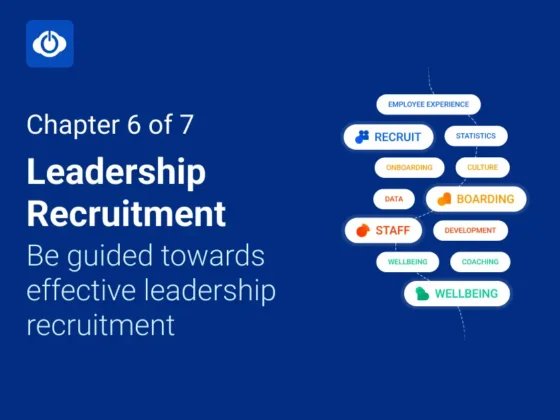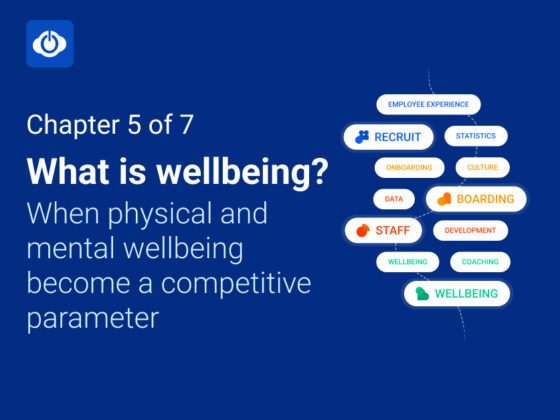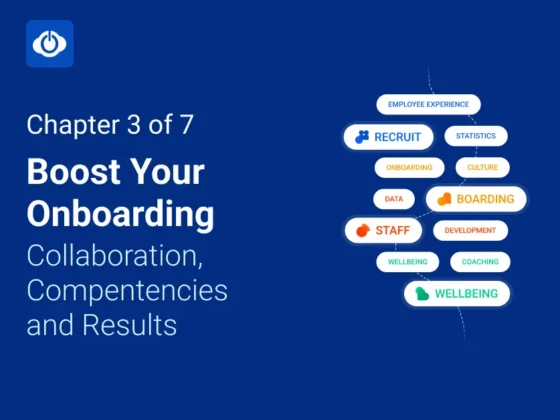GDPR and Recruitment: 5 Key Tips
We all know we live in a digital world where everything happens online. But do you know what to consider regarding GDPR and recruitment? In this blog post, we’ll share five essential tips on GDPR compliance in recruitment — especially what to look for when choosing a recruitment system.
As a recruiter, you protect candidates’ personal data and ensure it is handled securely. Once the recruitment process is complete and consent has expired, data must be deleted in compliance with regulations.
A good first step is to evaluate which candidate information is truly necessary. Are there questions in your application process that you could eliminate? And do you know what personal data your recruitment system collects?
Table of Contents
GDPR and Recruitment Explained
5 Tips for GDPR Compliance in Recruitment
How a Recruitment System Can Help Ensure GDPR Compliance
FAQ: GDPR and Recruitment
GDPR and Recruitment Explained
GDPR (General Data Protection Regulation) is an EU law designed to protect personal data. Companies collect and process various personal information that must be handled according to GDPR regulations during the hiring process.
Compliance is crucial to protecting candidate data and avoiding fines or reputational damage. Every company must understand its role in handling personal data.
When hiring a new employee, many aspects of the recruitment process demand attention — who to hire, what skills are needed, and how to evaluate candidates. But do you also discuss GDPR compliance? Is it something only one person worries about, or does your recruitment system take care of it automatically? Here are 5 tips.
You might also like: The A to Z of Recruitment: A Complete Guide
5 Tips for GDPR Compliance in Recruitment
If you manage recruitment for the first time, these 5 tips will help you ensure compliance and streamline your process. Furthermore, we’ll explain what HR-ON Recruit can do to help.
1) Obtain Candidate Consent
Before storing or sharing candidate data, you must obtain explicit consent. The candidate must actively approve storing and using their personal information in the recruitment process.
Consent should be documented and easy to withdraw. It’s also best practice to communicate how candidate data is used and for how long it will be retained.
With HR-ON Recruit, you can set up different consent forms and integrate them seamlessly into your recruitment process.
2) Store Personal Data Securely
Recruitment data often includes sensitive information like resumes, contact details, and references. Using GDPR-compliant systems is essential to protect data from unauthorized access.
Companies should utilize secure cloud solutions and restricted-access databases to minimize data breach risks. Additional security measures, such as encryption and two-factor authentication, further enhance protection.
With HR-ON Recruit, you get full GDPR compliance with secure login, role-based access, and system-wide security features.
3) Delete Data Within Legal Timeframes
Under GDPR, companies must only retain candidate data for as long as necessary. The general recommendation is to delete it after six months unless the candidate consented to a longer retention period.
Having clear data deletion policies ensures compliance and proper documentation of GDPR adherence.
In HR-ON Recruit, candidate data is automatically deleted once recruitment is completed and consent expires.
4) Use GDPR-Compliant Recruitment Systems
Companies ensure lawful data processing by choosing recruitment software designed with GDPR in mind. Automated deletion of outdated information and built-in consent management make compliance easier.
Many GDPR-related questions arise when evaluating HR and recruitment systems. To ensure compliance, checking the provider’s FAQ section is a good practice.
5) Train Your HR Team on GDPR
A key part of GDPR compliance is making sure employees understand the regulations. Regular training and updates on secure recruitment practices are crucial.
HR teams should stay informed about changes in legislation and adopt the latest data protection measures.
Managing data from multiple candidates can be challenging. However, with HR-ON Recruit, all candidate data stays securely within the system, regardless of how many team members are involved.
You might also like: Choosing the Right Onboarding Software: 6 Key Features You Need
How a Recruitment System Can Help Ensure GDPR Compliance
Now that you know the key GDPR principles, the next step is choosing a recruitment system that meets compliance requirements. Of course, a recruitment system offers much more than just GDPR security. One way to explore your options is to book a demo for a quick introduction.
With HR-ON Recruit, you get a GDPR-compliant recruitment system, so you can focus on hiring the best talent. Used by over 500 companies across various industries, it’s the perfect solution for businesses of all sizes.
Data protection under GDPR remains a top priority for all companies. Make sure your business is compliant. Want to learn more about HR-ON Recruit? Book a demo with a consultant or use the price calculator for a customized price.
This blog post is not legal advice. We recommend consulting a legal expert for professional guidance on data protection regulations.
FAQ: GDPR and Recruitment
What is GDPR in recruitment?
GDPR regulates how companies collect, store, and process personal data during recruitment.
How long can candidate data be stored?
Typically, no longer than six months unless the candidate provides valid consent for extended storage, companies should also have clear deletion procedures.
What does GDPR mean for job postings?
Employers should request only relevant information and follow data minimization principles, collecting only the necessary details to evaluate candidates.
How can companies ensure GDPR compliance?
Obtaining consent, using secure systems, deleting data on time, and training HR staff on GDPR rules can all be beneficial. Having a GDPR officer to oversee compliance can also be beneficial.
What candidate data can employers retain?
Only data necessary for recruitment, such as CVs, contact details, and job-related references. Employers must also ensure secure storage and limit access to authorized personnel.





